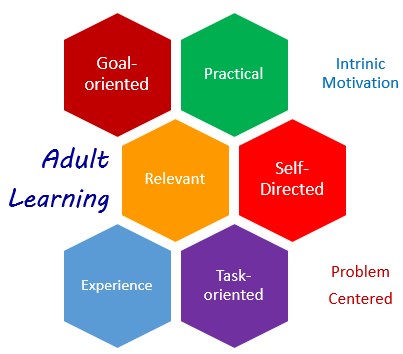Adult Learning Principles
Andragogy refers to the methods and practices of educating adult learners. It was popularized in the 1980s by Malcolm Knowles who suggested that adult learners have distinct characteristics.
The adult learning theory that Knowles developed details some of the ways in which adults learn differently than children. His adult learning theory also sets forth certain assumptions about how adults learn. Knowles identified six main assumptions regarding adult learning. Knowles principles and assumptions should be incorporated into the design and delivery of adult-oriented training or educational programs.
Knowles six adult learning principles:
- Adults are internally motivated and self-directed
- Adults bring life experiences and knowledge to learning experiences
- Adults are goal oriented
- Adults are relevancy oriented
- Adults are practical
- Adults need to be respected
Other Adults Learning Principles
Over the years, other have expanded on Knowles adult learning principles. Below are some of those additional principles that should be considered when designing or delivering adult learning programs.
Adults learn only when they are ready to learn
Adults are ready to learn when the need arises
Adults need to know why they should learn something
Adults want to know the benefits of what they are learning
Adults see learning as a means to an end, rather than an end in itself
Adults expect that what they are learning to be immediately useful
Adults want to focus on current issues rather than something that may be useful in the distant future
Adults decide for themselves what is important to be learned
Adults learn best when they actually perform
Adults are problem-oriented and want to apply what they have learned
Adults are task-oriented and have a task-centered approach to learning
Adults respond best to learning that is centered on performing common tasks
Adults are interested in approaching tasks directly related to their occupation
Adults want to focus on real-life problems and tasks rather than academic material
Adults need to take responsibility
Adults are autonomous and self-directed
Adults prefer a self-directed approach that allows for discovery on their own
Adults like to be involved in planning their instruction
Adults bring knowledge and experience to learning
Adults have a fixed viewpoint or perspective
Adults need to validate the information based on their beliefs and experiences
Adults have the ability to serve as a knowledgeable resource to fellow learners
Adults thrive in collaborative relationships with others
Adults learn easiest what is familiar
Adults are motivated by intrinsic and extrinsic factors
Adults have a strong need to maintain their self-esteem
Adults are pressed for time
Adults have preoccupations outside of work
Adults have different learning styles
Adults prefer a variety of teaching methods
Adults like to speak, participate, and contribute in the learning process
Adults learn better in an informal environment
Adults learn from their mistakes
Related Links
Teaching Strategies for Adult Learners
Strategies for Teaching Adult Learners
References for Adult Learning Principles
- Knowles, M S, 1980. “The Modern Practice of Adult Education: From Pedagogy to Andragogy”, Follett Publishing Company
- Knowles, M S, 1984, “Andragogy in Action: Applying Modern Principles of Adult Learning”, San Francisco, CA: Jossey-Bass.
- Knowles, M. S., Holton, E. F., & Swanson, R. A. (2015). The Adult Learner. The Definitive Classic in Adult Education and Human Resource Development (8th ed.). Oxon: Routlege.

